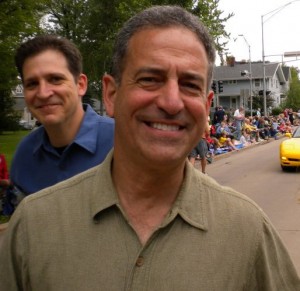Yes, I made it to the national airwaves this past week, thanks for asking (and thanks to Adrienne Hill for the interview).
The topic was the Corporate Average Fuel Economy (CAFE) standards, which have been controversial for a variety of reasons since their inception in the 1970s. The basic idea is simple enough, though: if the federal government mandates greater fuel efficiency, people will use less gas. Because the CAFE standards are politically viable and gasoline taxes are not, the CAFE standards have withstood the test of time, including a beefier rule promulgated by the Obama Administration in 2009.
This week’s issue arose because gasoline tax revenue is funneled back to fund highways and mass transit. Ergo, if we use less fuel, there will be less tax revenue for highways and mass transit. That is the conclusion of a Congressional Budget Office report from last week:
An increase of about 5 cents per gallon in the gasoline tax would be required to make up the shortfall in revenue projected as a result of the proposed CAFE standards.
And, so, man bites dog and consuming less fuel could lead to an increase in gasoline taxes, and the net result could be higher prices at the pump (Of course, federal gas taxes last went up during the pre-industrial era. A primary reason for CAFE standards is that Congress is unwilling to move the gas tax off its $0.186/gallon level).
The report generated a minor media buzz, including this very short report on National Public Radio’s Marketplace program where I provided some unsurprising insight.
My authority on the subject stems from a paper I co-authored back in the day, “The Economics of CAFE Reconsidered: A Response to CAFE Critics and A Case for Fuel Economy Standards,” where we make a case that the CAFE standards are a reasonable complement to stiffer gasoline taxes (we also argue for much stiffer gasoline taxes). I also have talked to US News and the Financial Times, among others. And I will talk to you, too, if you ask me about it.
For a very nice recent treatment, you might check this recent paper, “Automobile Fuel Economy Standards: Impacts, Efficiency, and Alternatives,” in the Review of Environmental Economics and Policy.
For some extremely tasty data, check out Environmental Protection Agency’s Light-Duty Automotive Technology and Fuel Economy Trends. They’ve been doing this report for years, and I always learn something when I go through the new one.
